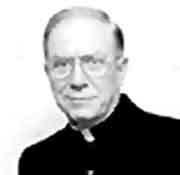 | Father Richard James Cleary was born and reared in Wichita. After graduation from Cathedral High School in 1947, he attended the seminary operated by the Benedictine monks of Conception Abbey in Northwestern Missouri. There he came to appreciate the life of the monks and, having obtained the permission of Bishop Mark Carroll of Wichita, he became a monk of that monastery. After being ordained a priest in 1955, his superiors sent him to get his master’s degree at the University of Ottawa, Canada, then to study in Athens, Greece, and then in Rome, Italy, where he obtained his doctor’s degree in Theology. Finally, he spent a year of study at Harvard University. Later, Fr. Cleary was assigned to teach for many years in Rome. In 1998, he returned to Wichita, where he served in parish ministry at St. Mary’s Cathedral and at Blessed Sacrament parishes. In 2001, his abbot (superior) transferred him to Arkansas, where he served as chaplain of the Benedictine Sisters of Holy Angels Convent in Jonesboro, and helped in the parishes of northeast Arkansas. In March 2010, he was re-assigned to his monastery, Conception Abbey, Conception, in Missouri 64433. He can be contacted there at, 660-944-2877, or by email: rjcleary@juno.com. |
Religion
2003-06-01 10:13:00
Can someone be reincarnated?
Question: Is it ever, under any circumstance, possible that someone is or was 'reincarnated'?
Answer: First of all, we must distinguish reincarnation from resurrection of the body. Resurrection is a fact and a basic doctrine of the Christian faith. Resurrection means: bringing back to life a person who has died. Jesus Christ died and three days later, through the power of God, arose from the dead in his same body. Likewise, those persons restored to life by miracles of Jesus had their souls reunited with their own bodies, e.g. Lazarus and the son of the widow of Naim and the daughter of Jairus. Similarly, on the day of final judgment at the end of time the soul or spirit (the principle of life) of every person who ever lived - from the first man and woman to the infant aborted in the womb -- will be reunited to its body by the power of God. No matter how changed and separated might be the particles of that body, they will be reassembled with their proper soul. Those who lived virtuous lives will arise to eternal life in heaven, while those who are wicked will arise to suffer forever in hell. That is the doctrine about resurrection of the body.
Reincarnation, however, is a theory about the rebirth of a soul in a new body. Sometimes this is called "transmigration of the soul." Various religions have at times entertained the idea that the soul of an individual human person, after death of its body, passes into another body or a new form. But such an idea is only speculation or wishful thinking. No one, under any circumstances, has been or will be reincarnated!
The great Jewish historian, Flavius Josephus, who lived in the first century, states that the Pharisees, a strict Jewish sect to which St. Paul belonged (cf: Acts 23:6 and 26:5), believed in reincarnation. Josephus writes that the Pharisees believed that "souls have an immortal life in them, and that under the earth there will be rewards or punishments, according as they have lived virtuously or viciously in this life" (Antiquities of the Jews, book 18, chapter 1, paragraph 3). Josephus adds: "The souls of good men only are removed into other bodies, but the souls of bad men are subject to eternal punishment" (Wars of the Jews, book 2, chapter 8, paragraph 14).
Although many of the beliefs of the Pharisees entered the Christian Church, the theory of reincarnation did not. Jesus and St. Paul were certainly familiar with the beliefs of the Pharisee sect. Being God, Jesus certainly knew the truth. If reincarnation were true, then Jesus and his Apostles would have mentioned it, along with their explicit teaching about the resurrection of the body. But they did not! And the Church, established by Jesus and guided by his Holy Spirit, has explicitly rejected the idea of reincarnation whenever and wherever it appears in the writings of Christians, e.g. the Synod of Whitby in 664 condemned that opinion held by some Celtic Christians, and the papacy in the 13th century authorized a crusade against the Albigensians who included reincarnation among their various erroneous teachings. The 5th ecumenical council held at Constantinople in 553 declared: "If anyone asserts the fictitious pre-existence of souls, or shall assert the absurd reincarnation, which follows from it: let him be anathema (excommunicated and condemned)."
Buddhists and Hindus believe in transmigration of human souls, from one body to another, even to animals and reptiles and birds and bugs, depending on whether in this life the person did good or evil. But they cannot demonstrate as fact even one example of such reincarnation.


